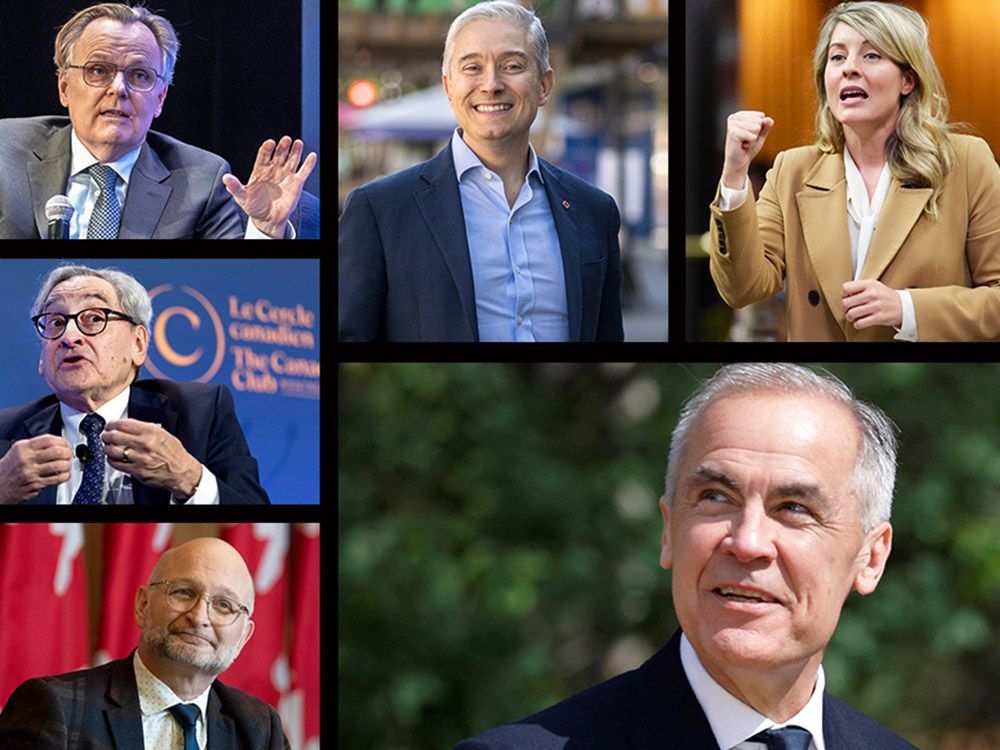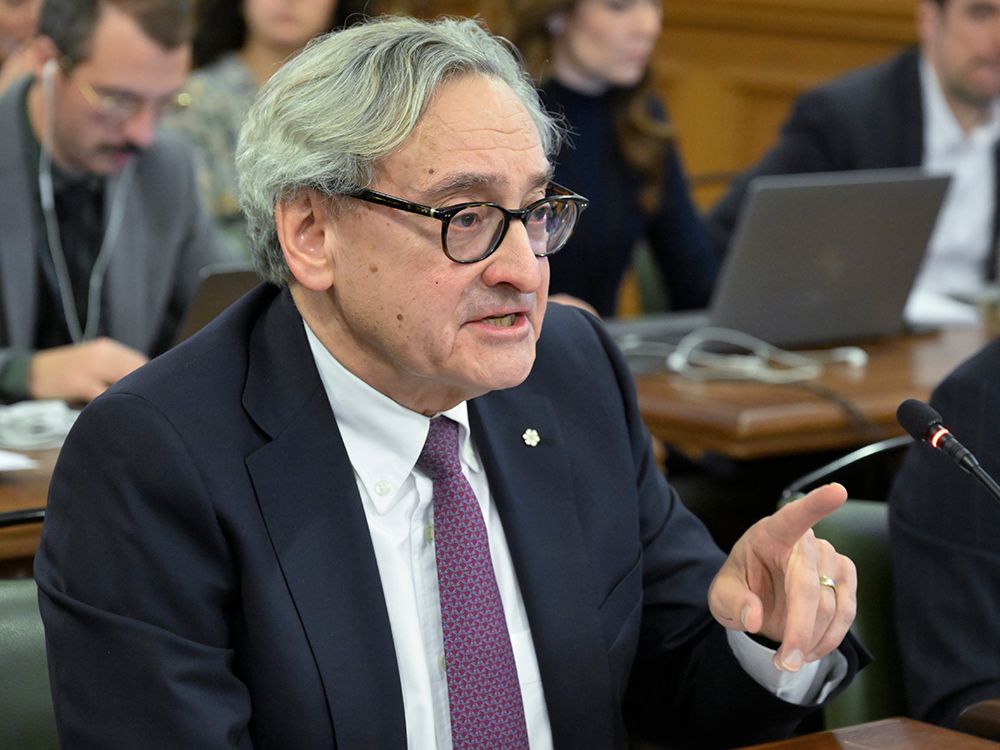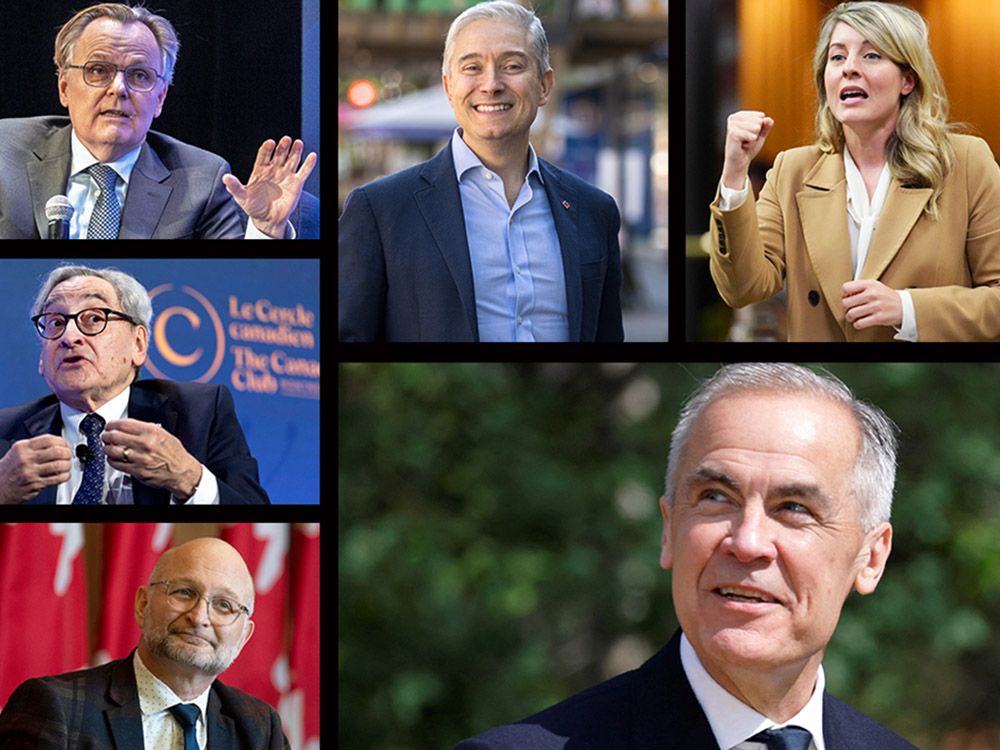
OTTAWA — Decades before they were patrolling the corridors of power in downtown Ottawa, Michael Sabia and Peter Harder were marching through the same hallway for violin lessons in St. Catharines, Ont.
Each took lessons from Sister Mary Alexander in the early 1960s as they honed their skills and even trained to play together one year at the local Kiwanis Festival.
Their paths crossed again decades later in the federal government when they both worked for Mulroney-era cabinet ministers.
Today, more than 60 years after those first violin lessons, the two men are pulling on different strings as influential players in Canadian politics.
Harder, a former deputy minister, has become an influential senator on Parliament Hill, while Sabia has established himself as a well-respected top executive in both the public and private sectors. He’s made stops in corner offices at CN, Bell Canada, the Caisse de dépôt et de Placement du Québec (CDPQ) and Hydro-Québec.
On Monday, he will return to work in Ottawa to become the Clerk of the Privy Council, the country’s top civil servant and one of the many key players in this government who comes from or made their names in Quebec.
While
he won’t be wielding a chainsaw
, like an Elon Musk-style “disruptor,” Sabia is known as an agent of change who is “risk tolerant and outcome-focused,” Harder told National Post, “rather than process-focused and mistake avoidance.”
As for the consequences of Sabia taking on the top job in the public service, Harder stops short of saying that he expects cuts to the Canadian bureaucracy. But he said he expects his old violin mate to lead a process of “delayering” the bureaucracy to help it keep up with “the pace and breadth of change that Prime Minister (Mark) Carney is intent on leading.”
In Sabia, Carney found a seasoned executive but also an anglophone, just like him, who enjoyed tremendous success in a province known for its sensitivities: Quebec.
Since the federal election in April when his Liberals surprisingly dominated Quebec, Carney has surrounded himself with high-level politicians from Quebec such as Finance Minister François-Philippe Champagne, Industry Minister Mélanie Joly and House Leader Steven Mackinnon.
Other senior officials in the Carney government from Quebec include incoming chief of staff Marc-André Blanchard, an influential Montreal lawyer and former Ambassador to the United Nations; and David Lametti, a former Montreal MP, minister of justice and law professor at McGill University who was chosen by Carney to be his principal secretary.
While some believe Carney has an electoral debt to pay to Quebec, Harder said it’s important to look broadly at the key players in a government as a collective. “Public service is a team sport,” he said.
National Post spoke with more than a dozen sources for this article to gain insight into Carney’s new team, with a focus on the Quebec angle. Sabia did not comment for this story. Several suggested that the influx of senior officials from that province is largely a coincidence, that they got their jobs simply because of experience and talent.
If so, it’s a happy coincidence for Carney, a prime minister who grew up mostly in Edmonton, has spent much of his career in Ottawa, and speaks French as a second language. But some academics and other Ottawa insiders suggest that the prime minister is well aware that his connections to Quebec are fragile.
“Quebec is important,” said a source in the prime minister’s office that spoke on background. “The prime minister is not from Quebec, and it is important that he have this perspective. Quebec has its own culture, its own identity, and its own language.”
The key question centres on the possible effects of this Quebec-heavy contingent in the Carney government, both in terms of policy and politics. Will it help, for example, earn support for pipelines or ports that require Quebec to be on board?
Or could it mean new models or ways of looking at these major projects, such as the use of pension funds as a financial tool?
Either way, the Quebec element in the Carney government is, perhaps surprisingly, a marked change from the previous regime. Former prime minister Justin Trudeau, despite being a bilingual Quebecer, was often criticized because people from his home province held a limited number of the top jobs in his government.
And so far, no matter the ingredients in the recipe or the motivations behind the government plan, it’s clearly working. Carney is widely seen as the most popular politician in Quebec, despite his limited connections to the province.
placed him and Joly as the two most popular politicians in Quebec.
One of his first moves was to hire the Ontario-born Sabia, one of the best-known and most-respected business leaders in Quebec, to lead the government’s swelling public service.
When Sabia was appointed head of the CDPQ in 2008, former business journalist Pierre Duhamel, who now advises business people at HEC Montréal, didn’t like the hire. Like many other Quebecers at the time, Duhamel was unconvinced by the idea of appointing a “Canadian” executive with a telecom background to lead Quebec’s financial rock.

A few years later, Duhamel described Sabia’s tenure at such a complex institution as “remarkable.” After a difficult period in the 2000s, Sabia diversified investments, globalized the Caisse, and launched CDPQ Infra, an infrastructure arm that oversees major infrastructure projects such as Montreal’s light rail network, and enabled the pension fund to achieve strong performance.
“But what I admire most are Mr. Sabia’s management skills and political acumen,” he wrote in
.
The Caisse is a public pension fund that has been enshrined in Quebec’s economy, culture and politics since 1965. Today, it has 11 offices around the world and $473 billion in assets.
The Caisse is also the most recent employer of Carney’s new chief of staff, Blanchard, who was a vice-president and head of CDPQ Global.
Duhamel said during an interview that he suspected that the two men had not been recruited because of their connections to Quebec, but rather to help facilitate new infrastructure projects that Carney would like to help finance through pension funds or private investors.
“I saw that he was looking for people who knew this world, who were able to assess its potential, but also its constraints,” he said.
Sabia has said recently at a public event, however, that the major pension funds — Canada Pension Plan Investment Board and the CDPQ — are likely not the best candidates to help finance most infrastructure projects because they can be too risky for pension funds and are unlikely to deliver strong returns in the early years.
Instead, early-stage capital mechanisms that aren’t as risk averse need to be developed to get these projects started. Pension funds are more likely to get involved once a project is off the ground and producing returns.
Since pension funds are responsible for investing in ways that generate returns for their beneficiaries, which often means investing outside Canada, Trevor Tombe, a economics professor at the University of Calgary, believes they “should not be seen as a vehicle for economic development.”
Quebec has a dual mandate within its public pension plan, he added, but the Canada Pension Plan is different.
“Whether or not the prime minister wants the CPP to invest more in Canada, he can’t do it unilaterally,” he added. “But I think he should ask himself what the underlying reasons are for why capital is sometimes deployed elsewhere.”
It all depends on the economic context in the country. Conservative Leader
Pierre Poilievre recently told The Hub
that he couldn’t care less about the origins of Carney’s aides, but said he fears the ideology of what he sees as a state-run economy.
“It’s a central planning model that has failed every time it’s been implemented around the world. It significantly enriches a small group of very influential insiders.”
Another possible policy implication from the strong Quebec voices is that the proposed high-speed rail project from Windsor to Quebec City could get stronger support. It could also mean greater advocacy for the province’s energy sector, government procurement that could bolster Montreal-area aerospace companies, and prioritizing the health of the aluminum industry in trade talks with the U.S.
For Sandra Aubé, Joly’s former chief of staff at Foreign Affairs and a former Trudeau advisor, if Carney really wants to make Canada the G7’s strongest economy, he has no choice but to create a more unified economy that includes Quebec.
“We must not delude ourselves that Canada’s biggest challenge in achieving all this is having energy. If we don’t have the necessary electricity, for example, we won’t be able to carry out any transformation whatsoever,” said Aubé, now a vice-president at TACT Conseil.
Another possible effect is that the high-ranking Quebecers may also be asked to play a unique role in advancing the government’s agenda if the government needs to “sell” the notion of some of the government’s proposed big infrastructure projects in that province, according to Lori Turnbull, a political science professor at Dalhousie University in Halifax.
The odds of success regarding, for example, running a pipeline through Quebec are greater if high-profile Quebecers are playing a leading role in promoting the idea, she said.
Beyond the policy, there are also no doubt political implications of the strong Quebec voice in the Carney government, a wide range of sources say.
Firstly, many in Quebec expect that these senior figures, in conjunction with a Quebec caucus of 44 Liberal MPs — more than one quarter of the total Liberal contingent in the House of Commons — will be able to take good care of their home province over the next few years.
Quebec Premier Francois Legault stated the case clearly. “Mark Carney owes one to Quebecers,” he said after the Liberals claimed their best result in a federal election there since 1980.
But the flip side, that Carney expects these Quebecers to also help execute the government’s agenda in their home province, is likely also true.
Beyond who will be best able to deliver for whom, there’s also the intangible sense of understanding a part of a country or region. In an interview, Legault’s intergovernmental affairs minister Simon Jolin-Barrette said in Carney’s government “there really is a positive change in attitude” and an “openness toward Quebec” that wasn’t always the case with the Trudeau government.
Both in Quebec City and Ottawa, there is, at least for now, a feeling that having people from Quebec around the prime minister who know the province, its particularities and positions on language, culture, state secularism and immigration will facilitate a relationship that has often been rocky.
The province wants Ottawa to understand its sense of autonomy, but also the need for investments in the province that “Quebec has its share,” said Jolin-Barrette. “We sense a greater openness. There is an openness in Ottawa. There is a better understanding of Quebec’s issues now, with Mr. Carney.”
Turnbull said Carney is clearly trying to show that Quebec is not at a disadvantage because he’s from elsewhere.
“There’s some politics behind those parts of it,” she said.
The Joly and Champagne appointments may have in part been rewards for supporting Carney during the Liberal leadership race, Turnbull said, when either could have been legitimate candidates themselves.
The strong Quebec contingent may also play a role in national unity, at least in that province. The separatist movement is gaining ground in Quebec (and Alberta), with the Parti Québécois leading in every poll, with a provincial election in 2026.
But making a major electoral contribution to a government doesn’t always guarantee anything. After the 1980 Liberal victory, when Quebecers supported the government with 74 seats out of 75, Prime Minister Pierre Trudeau reached an agreement with all provinces, except Quebec, on a new constitution. More than four decades later, Quebec still hasn’t signed, and the perceived betrayal is still very real for many in that province.
Maybe, just maybe, like Sabia over a decade ago at the Caisse de dépôt, Carney is trying to be the anglophone that Quebec needs.
National Post
Our website is the place for the latest breaking news, exclusive scoops, longreads and provocative commentary. Please bookmark nationalpost.com and sign up for our newsletters here.
